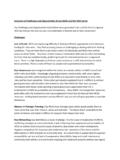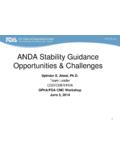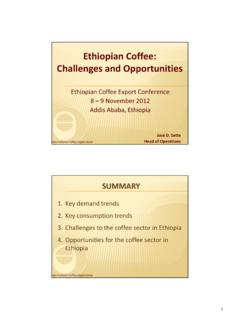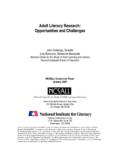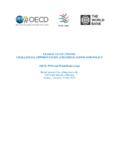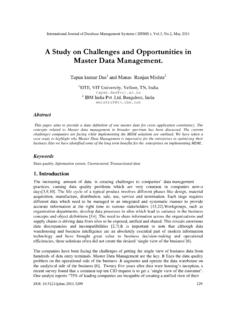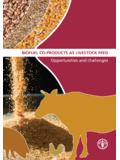Transcription of Opportunities, Challenges and Good Practices …
1 OECD Global Science ForumOECD Global Science ForumOpportunities, Challenges and Good Practices in International Research Cooperation between Developed and Developing CountriesOpportunities, Challenges and Good Practices in International Research Cooperation between Developed and Developing CountriesA PR I L 2 011 Photo on front cover : Indonesian and Japanese researchers working together to identify anti-Hepatitis C virus (HCV) substances and to develop HCV and dengue vaccines in the framework of the SATREPS program, funded by JST and JICA SATREPSThis report of the OECD Global Science Forum describes issues and options that deserve the attention of scientists and administrators in industrialised countries and in developing countries, as they seek to design, initiate and manage collaborative research programmes and projects that include both scientifi c and development goals.
2 The report identifi es good Practices and new ideas, and presents options for concrete actions, compiled during the course of the Global Science Forum project, which included a data-gathering and analysis phase, and culminated in a workshop held in Pretoria, South Africa, in September between science policy and the mechanisms of development aid already exist in some countries. Offi cial Development Assistance (ODA) has traditionally been used mainly to provide technical assistance, but there are now new motivations and opportunities to support scientifi c collaboration for developmental goals, and to strengthen research capacity, especially in the developing countries. In recent years, a number of countries and private organisations have assigned a higher priority to global issues, have put more emphasis on collaborative research, and have moved beyond traditional technology transfer.
3 In the industrialised countries, scientists and policy makers increasingly turn to countries in the developing world as desirable and even crucial partners who can provide a wide range of expertise, resources, and other benefi ts, from natural research sites to future commercial markets for high-technology products. Meanwhile, a growing number of developing countries are building and enhancing research capacity to create and utilize new knowledge that is essential for their economic growth, and for dealing with the local effects of global-scale problems in domains such as health, food production, or environmental protection. This OECD report is meant to facilitate international cooperation, to build confi dence and trust between scientists and administrators, and to enhance ownership of research results by all 1 of 20 Organisation for Economic Co-operation and Development (OECD)
4 Global Science Forum Report on opportunities , Challenges and Good Practices in International Research Cooperation between Developed and Developing Countries Contents page 1 Rationale and Background 3 2 Balance in Research Cooperation Scientific Achievement and Development Impact Inputs and Contributions from the Research Partners Top-Down and Bottom-Up Approaches 4 4 5 5 3 Capacity Building 7 4 Issues and Options for Consideration by Programme Designers, Agency Officials, Research Administrators and Scientists Designing Programmes Soliciting Project Proposals Reviewing and Selecting Project Proposals Ensuring Sound Financial Management Adopting Effective Tools and Procedures during Programme Execution Utilising and Evaluating the Outcomes of Projects 9 10 11 12 13 13 14 Appendices 15 Page 2 of 20 The Organisation for Economic Co-operation and Development (OECD) groups thirty-four Member countries committed to democratic government and the market economy.
5 It is a venue where governments can exchange and compare policy experiences, identify good Practices and agree on decisions and action recommendations. Dialogue, consensus, peer review and peer pressure are at the heart of the OECD s procedures. The Organisation s mission is to help governments and society reap the full benefits of globalisation, while tackling the economic, social, environmental and governance Challenges that accompany it. A high priority is placed on anticipating emerging issues and identifying policies that work in actual practice. In addition to the analysis and advice it provides on a vast range of economic issues, the OECD is one of the world s largest and most reliable sources of comparable statistical, economic and social data. OECD databases span areas as diverse as national accounts, economic indicators, trade, employment, migration, education, energy, and health.
6 The OECD produces internationally agreed instruments, decisions and recommendations in many areas, such as combating bribery in international business transactions, information and communications policy, taxation and environmental protection. Non-member countries are invited to subscribe to these agreements and treaties. Helping ensure development beyond the OECD s membership has been part of the Organisation s mission from the start. The Organisation maintains active relationships with some 70 non-member economies, along with businesses, labour organisations, civil society and parliaments. These stakeholders benefit from, and make valuable contributions to, the work of the OECD. The Global Science Forum (GSF) is a venue for consultations among senior science policy officials of the OECD member and observer countries on matters relating to fundamental scientific research.
7 The Forum s activities produce findings and recommendations for actions by governments, international organisations, and the scientific community. The GSF s mandate was adopted by OECD science ministers in 1999, and has been extended until 2013. The Forum serves its member delegations by exploring opportunities for new or enhanced international co-operation in selected scientific areas; by defining international frameworks for national or regional science policy decisions; and by addressing the scientific dimensions of issues of social concern. The Global Science Forum meets twice each year. At these meetings, selected subsidiary activities are reviewed and approved, based on proposals from national governments. The activities may take the form of studies, working groups, task forces, and workshops.
8 The normal duration of an activity is one or two years, and a public policy-level report is always issued. The Forum s reports are available at The GSF staff, who are international civil servants, are based at OECD headquarters in Paris, and can be contacted at Page 3 of 20 1. Rationale and Background Rationale Global issues ( , environmental protection, energy security, natural disaster mitigation, preventing and curing infectious diseases, ensuring food security) are increasingly the subject of policy-level deliberations, both nationally and internationally. It is recognised that international cooperation in science and technology is needed to deal with these issues. Cooperation between developed countries (or, industrialised countries; in this report, the abbreviation IC is used) and developing countries (DC)1 is of special importance, because DCs are often the ones most severely affected by global threats, and because they possess much of the expertise, data and resources that are needed for finding effective solutions.
9 This OECD report describes issues and options that deserve the attention of scientists and administrators in ICs and in DCs, as they seek to design, initiate and manage collaborative research programmes and projects that include both scientific and development goals. Links between science policy and the mechanisms of development aid (such as those of Official Development Assistance (ODA)) already exist in some countries. ODA has traditionally been used mainly to provide technical assistance, but there are now new motivations and opportunities to support scientific collaboration for developmental goals, and to strengthen research capacity, especially in DCs. In recent years, a number of countries and private organisations have assigned a higher priority to global issues, have put more emphasis on collaborative research, and have moved beyond traditional technology transfer.
10 In the ICs, scientists and policy makers increasingly turn towards DCs as desirable and even crucial partners who can provide a wide range of expertise, resources and other benefits, from natural research sites to future commercial markets for high-technology products. Some ICs are identifying ways to organize projects that encourage the full participation of researchers from the DCs where field research is to take place. Meanwhile, a growing number of DCs are actively building and enhancing research capacity to create and utilize the new knowledge that is essential for their economic growth, and for addressing the local manifestations of global-scale problems. Recognising the importance of the above trends, and seeking to maximise the benefits of cooperation through linking science policy and development goals, the OECD Global Science Forum launched an activity on opportunities , Challenges and Good Practices in International Research Cooperation between Developed and Developing Countries.










